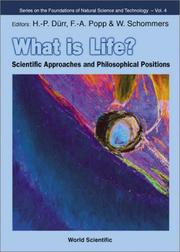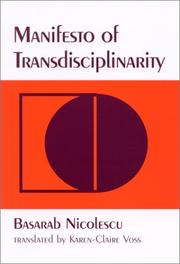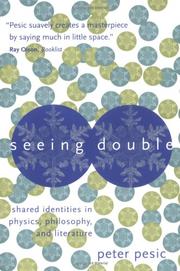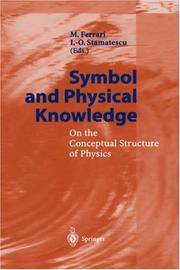| Listing 1 - 10 of 35 | << page >> |
Sort by
|

ISBN: 1281908878 9786611908874 9812706569 9789812706560 9789810247409 9810247400 Year: 2002 Publisher: Singapore River Edge, NJ World Scientific
Abstract | Keywords | Export | Availability | Bookmark
 Loading...
Loading...Choose an application
- Reference Manager
- EndNote
- RefWorks (Direct export to RefWorks)
The book of Erwin Schrödinger about life evokes a variety of basic questions concerning the understanding of life in terms of modern physics rather than biochemistry. Problems of organization and regulation of biological systems cannot be understood by revealing only the chemical processes of the living state. A group of reputable physicists - among them the followers of Heisenberg and Fröhlich - and biologists came to this same conclusion through several workshops on this topic. This book contains their contributions, written from different viewpoints of theoretical physics and modern biology
Life. --- Philosophy and science. --- Science and philosophy --- Science --- Life --- Philosophy

ISBN: 223405477X Year: 2002 Publisher: Paris : Stock,
Abstract | Keywords | Export | Availability | Bookmark
 Loading...
Loading...Choose an application
- Reference Manager
- EndNote
- RefWorks (Direct export to RefWorks)
LITERATURE AND SCIENCES --- PHILOSOPHY AND SCIENCE --- SCIENCE --- STUDY AND TEACHING

ISBN: 2844541496 9782844541499 Year: 2002 Publisher: Paris: Dervy,
Abstract | Keywords | Export | Availability | Bookmark
 Loading...
Loading...Choose an application
- Reference Manager
- EndNote
- RefWorks (Direct export to RefWorks)
Science --- Archetype (Psychology) --- Philosophy and science --- Myth. --- Myth

ISBN: 9782070416257 2070416259 Year: 2002 Publisher: Paris: Gallimard,
Abstract | Keywords | Export | Availability | Bookmark
 Loading...
Loading...Choose an application
- Reference Manager
- EndNote
- RefWorks (Direct export to RefWorks)
Quels rapports, depuis les commencements, les philosophes ontils noués avec la science ? Il ne s'agit pas ici de dresser l'inventaire des problèmes philosophiques que soulèvent les sciences ou la science, ni d'évaluer les réponses qui y furent apportées, mais, à l'inverse, de s'interroger sur les manières multiples dont les philosophes se sont représenté la science - état d'un sujet connaissant ou activité savante - système d'énoncés ou méthode de recherche, voire ensemble de disciplines constituées - et les problèmes afférents à chacune de ces représentations. A l'exhaustivité historique, il a été préféré le questionnement philosophique. L'ouvrage se déploie à partir de quatre grandes problématiques : " La science " ? (Platon ; Descartes, Newton ; Leibniz ; L'Encyclopédie ; Carnap) ; Critiques et limites de la science (empirisme et scepticisme anglais ; Kant ; Bergson, Brunschvicg ; Heidegger ; Wittgenstein) ; Science et naturalisme (Aristote ; Mach ; Bolzano ; Husserl ; Quine) Science, histoire et société (Comte ; Durkheim ; l'école de Francfort ; Bachelard, Canguilhem, Foucault ; logique de la science et révolutions scientifiques).
Philosophy and science - History --- Science - Philosophy - History --- Philosophes --- Philosophie des sciences --- Philosophie et sciences --- Philosophy and science --- Science

ISBN: 2130524850 Year: 2002 Volume: 9 Publisher: Paris PUF
Abstract | Keywords | Export | Availability | Bookmark
 Loading...
Loading...Choose an application
- Reference Manager
- EndNote
- RefWorks (Direct export to RefWorks)
Filosofie en wetenschap --- Philosophie et science --- Philosophy and science --- Science --- Philosophy
Book
ISBN: 2951606249 9782951606241 Year: 2002 Publisher: Franceville Jean A. Ternisien
Abstract | Keywords | Export | Availability | Bookmark
 Loading...
Loading...Choose an application
- Reference Manager
- EndNote
- RefWorks (Direct export to RefWorks)
God --- Philosophical anthropology --- Philosophy and science --- Metaphysics --- Mysticism --- Dieu --- Anthropologie philosophique --- Philosophie et sciences --- Métaphysique --- Mysticisme --- Métaphysique --- Physique --- Philosophie
Book
ISBN: 9782711683475 9782890079441 2711683478 2890079449 Year: 2002 Volume: 14 Publisher: Paris Vrin
Abstract | Keywords | Export | Availability | Bookmark
 Loading...
Loading...Choose an application
- Reference Manager
- EndNote
- RefWorks (Direct export to RefWorks)
Philosophy and science. --- Logical positivism. --- Philosophie et sciences --- Positivisme logique --- Carnap, Rudolf, --- Carnap, Rudolf --- Congresses --- Logical positivism --- Carnap, Rudolf (1891-1970) --- Critique et interprétation

ISBN: 0791452611 079145262X Year: 2002 Volume: *2
Abstract | Keywords | Export | Availability | Bookmark
 Loading...
Loading...Choose an application
- Reference Manager
- EndNote
- RefWorks (Direct export to RefWorks)
Filosofie en wetenschap --- Philosophie et science --- Philosophy and science --- Philosophy and science. --- Science --- 1 --- 5 --- Normal science --- Philosophy of science --- Science and philosophy --- Philosophy. --- Filosofie. Psychologie --- Wiskunde. Natuurwetenschappen --- 5 Wiskunde. Natuurwetenschappen --- 1 Filosofie. Psychologie --- Philosophy --- 5 Mathematics. Natural sciences --- Mathematics. Natural sciences --- 1 Philosophy. Psychology --- Philosophy. Psychology

ISBN: 026228149X 0585437270 9780262281492 9780585437279 9780262661737 0262162059 9780262162050 026266173X Year: 2002 Publisher: Cambridge, Mass. MIT Press
Abstract | Keywords | Export | Availability | Bookmark
 Loading...
Loading...Choose an application
- Reference Manager
- EndNote
- RefWorks (Direct export to RefWorks)
"The separateness and connection of individuals is perhaps the central question of human life: What, exactly, is my individuality? To what degree is it unique? To what degree can it be shared, and how? To the many philosophical and literary speculations about these topics over time, modern science has added the curious twist of quantum theory, which requires that the elementary particles of which everything consists have no individuality at all. All aspects of chemistry depend on this lack of individuality, as do many branches of physics. From where, then, does our individuality come?" "In Seeing Double, Peter Pesic invites readers to explore this intriguing set of questions. He draws on literary and historical examples that open the mind (from Homer to Martin Guerre to Kafka), philosophical analyses that have helped to make our thinking and speech more precise, and scientific work that has enabled us to characterize the phenomena of nature. Though he does not try to be all-inclusive, Pesic presents a broad range of ideas, building toward a specific point of view: that the crux of modern quantum theory is its clash with our ordinary concept of individuality. This represents a departure from the usual understanding of quantum theory. Pesic argues that what is bizarre about quantum theory becomes more intelligible as we reconsider what we mean by individuality and identity in ordinary experience. In turn, quantum identity opens a new perspective on us."--Jacket.
Identity (Psychology) --- Individuality. --- Psychology and literature. --- Psychology and philosophy. --- Philosophy and science. --- Individuality --- Psychology and literature --- Psychology and philosophy --- Philosophy and science --- Psychology --- Social Sciences --- Literature and psychology --- Personal identity --- Science and philosophy --- Philosophy and psychology --- Literature --- Conformity --- Likes and dislikes --- Personality --- Self --- Ego (Psychology) --- Science --- Philosophy --- PHILOSOPHY/General --- PHYSICAL SCIENCES/General --- Identity (Psychology).

ISBN: 3540414673 364207474X 3662048558 Year: 2002 Publisher: Berlin Springer
Abstract | Keywords | Export | Availability | Bookmark
 Loading...
Loading...Choose an application
- Reference Manager
- EndNote
- RefWorks (Direct export to RefWorks)
This book tackles the question of the symbolic structure of physics, a topic which is implicit in any theory of knowledge, but one that often seems to be ignored as an explicit and central element in today's epistemological debates. The elucidation of this problem should benefit a number of ongoing discussions and can help to avoid much recurring confusion. The contributions to the book have been chosen so as to provide a coherent view, ultimately addressing the relation between the concepts used in science and the real world. The first part provides an introduction to the problem as it arises in physics, and to the modern history of symbols. The subject of the second part is the epistemological discussion taking place between physicists and philosophers about the role of symbols in our knowledge of Nature. The third part addresses key issues related to the methodology of physics and the character of its symbolic structures. The aim of this book is to provide a consistent, if not comprehensive, view, emphasizing aspects that are paradigmatic for the natural sciences as a whole.
Physics --- Semiotics --- Signs and symbols. --- Philosophy. --- Physics. --- Philosophy and science. --- Epistemology. --- History and Philosophical Foundations of Physics. --- Philosophy of Science. --- Epistemology --- Theory of knowledge --- Philosophy --- Psychology --- Science and philosophy --- Science --- Natural philosophy --- Philosophy, Natural --- Physical sciences --- Dynamics
| Listing 1 - 10 of 35 | << page >> |
Sort by
|

 Search
Search Feedback
Feedback About
About Help
Help News
News